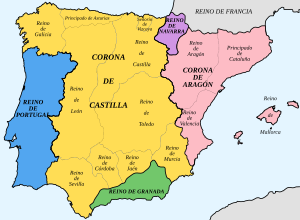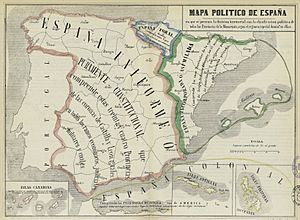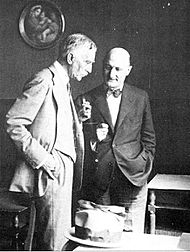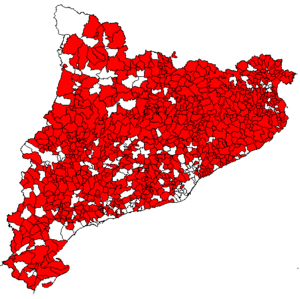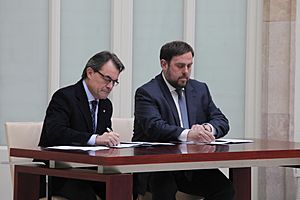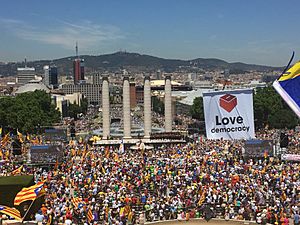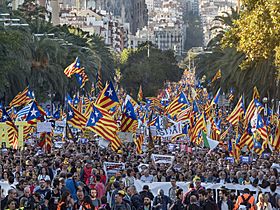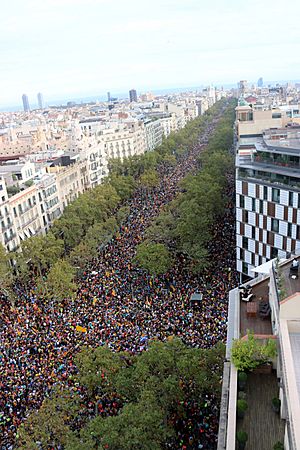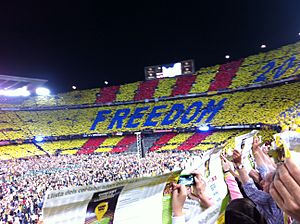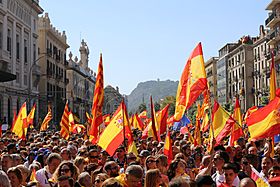Catalan independence movement facts for kids
The Catalan independence movement is a political and social movement in Catalonia, a region in northeastern Spain. Its main goal is for Catalonia to become an independent country, separate from Spain. This idea comes from Catalan nationalism, which is a strong feeling of pride in Catalan culture, language, and history.
The idea of Catalonia being separate from Spain started to grow in the mid-1800s. This was a time when many parts of Europe were developing strong national identities. The first organized political party that wanted independence for Catalonia was called Estat Català (Catalan State), formed in 1922 by Francesc Macià. In 1931, Macià even declared a Catalan Republic within Spain, but later agreed to more self-rule (autonomy) instead.
During the Spanish Civil War, a leader named General Francisco Franco took away Catalonia's self-rule in 1938. After Franco died in 1975, Spain became a democracy again, and Catalonia regained some of its autonomy, but the focus was more on self-rule within Spain rather than full independence.
The modern independence movement really picked up speed around 2009. This happened after a big financial crisis and when a Spanish political party challenged Catalonia's rules for self-governance in court. Between 2009 and 2011, many towns in Catalonia held unofficial votes about independence. In 2010, a court ruling that changed parts of Catalonia's self-governance rules led to huge protests. This led to an election in 2012 where, for the first time, pro-independence parties won a majority of seats in the Catalan parliament.
In 2014, the Catalan government held a "non-binding" vote on self-determination. Most people who voted chose independence, but many people who were against independence didn't vote, so the overall turnout was low. Another election in 2015 led to calls for a new, binding vote.
Contents
History
Early Times
Catalonia, known as the Principality of Catalonia, was once part of the Crown of Aragon. This was a group of lands that joined together in 1137. Later, in the late 1400s, the Crown of Aragon joined with the Crown of Castile through marriage, forming what would become the country of Spain.
At first, Catalonia and other parts of the Crown of Aragon kept their own special laws and political groups. They even fought a war to protect these rights. In 1640, during a big European war, Catalan farmers rebelled in what was called the Reapers' War. Catalonia then tried to become independent and asked France for help. After a decade of fighting, Spain took back most of Catalonia, but Catalonia still kept its old laws.
During the War of the Spanish Succession in the early 1700s, most of Catalonia supported a different king. But in 1714, the city of Barcelona surrendered to the other side. This date, September 11, is now celebrated as the National Day of Catalonia. After this war, Spain became more centralized, meaning the government in Madrid had more control. New laws were put in place that removed Catalonia's special laws and political groups. The Spanish government also tried to make the Castilian language (Spanish) more common in Catalonia.
Even though Catalonia lost its old laws, the idea of getting them back, or even becoming independent, started to grow in the mid-1800s. This period was called the Renaixença, a cultural rebirth that brought back interest in the Catalan language and traditions. This led to the growth of Catalan nationalism and a desire for more self-government.
The 1900s
The first political party to openly support independence in Catalonia was Estat Català (Catalan State), started in 1922 by Francesc Macià. In 1931, Macià's party joined with others to form Esquerra Republicana de Catalunya (Republican Left of Catalonia; ERC). After winning local elections, Macià declared a Catalan Republic on April 14, 1931. However, after talks with the new Spanish government, he agreed to Catalonia having self-rule within Spain. Catalonia received its own special rules for self-governance in 1932.
But this self-rule didn't last long. During the Spanish Civil War, General Francisco Franco took control of Spain and ended Catalonia's self-rule in 1938. After Franco's death in 1975, Spain became a democracy again. A new Spanish constitution was created in 1978, which said Spain was one country but also recognized the right of regions like Catalonia to have self-rule. Catalonia then got a new self-governance law in 1979, which most people supported. For a while, this led to less support for full independence.
In the 1980s, a group called Crida a la Solidaritat (Call for Solidarity) formed to protect the Catalan language and culture. This group also started to ask for independence. They organized big protests and used peaceful actions to promote Catalan.
New Self-Rule and Recent Events
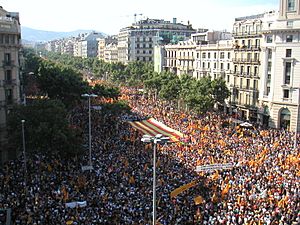
In 2003, a new group of left-wing parties took power in Catalonia. They worked on a new set of rules for Catalonia's self-governance. This new plan was approved by the Catalan parliament. However, when it went to the Spanish parliament, some parts were changed, especially those about money and the Catalan language. A Spanish court later ruled that some parts of the new rules were against the Spanish constitution.
This court decision in 2010 caused a huge protest in Barcelona, with over a million people marching. Around this time, many towns in Catalonia started holding their own unofficial votes on independence. These local votes, along with big demonstrations organized by groups like Òmnium Cultural and the Assemblea Nacional Catalana (ANC), showed a growing desire for independence from the people.
In 2012, a large demonstration on September 11 (Catalonia's National Day) asked the Catalan government to start the process of becoming independent. This led to a new election, and the Catalan parliament decided that a vote on independence would be held.
The 2014 Vote
The Catalan government leaders, Artur Mas and Oriol Junqueras, agreed to hold an independence vote on November 9, 2014. The vote would ask two questions: "Do you want Catalonia to become a State?" and (if yes) "Do you want this State to be independent?"
The Spanish government said this vote was against the constitution. The Spanish Constitutional Court agreed, saying the declaration of sovereignty was unconstitutional. Despite this, the Catalan government went ahead with the vote, calling it a "process of citizen participation" and using volunteers to supervise it.
The results showed that 81% of those who voted chose "yes-yes" (meaning they wanted Catalonia to be an independent state). However, only about 42% of eligible voters participated. Many people who were against independence chose not to vote, seeing it as illegal. After the vote, criminal charges were brought against Mas and others for going against the court order.
In 2015, pro-independence parties won a majority of seats in the Catalan parliament, though they didn't get a majority of all votes. They then passed a resolution to start the independence process. Carles Puigdemont became the new president of Catalonia. He took his oath without promising loyalty to the Spanish king or constitution, which was a first.
The 2017 Referendum and Declaration
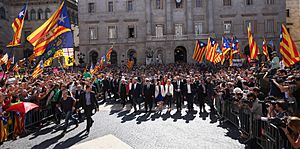
In September 2016, President Puigdemont announced that a binding vote on independence would be held in September 2017, even if the Spanish government didn't agree. The vote was set for October 1, 2017, and the question was: "Do you want Catalonia to become an independent state in the form of a republic?" The Spanish government immediately said the vote was illegal and would not happen.
The Catalan parliament passed a law to create an independent republic if the "yes" vote won. However, opposition parties protested and walked out, saying it was against democracy. The Spanish Constitutional Court quickly suspended this law, meaning the referendum could not legally go ahead.
The Spanish government tried to stop the vote by seizing ballot papers, shutting down websites, and sending police from other parts of Spain to close polling places. Despite these efforts, the referendum took place on October 1, 2017. There were reports of violence from Spanish police trying to stop people from voting, which caused many injuries and shocked people around the world.
According to Catalan authorities, 90% of voters supported independence, but only 43% of people voted. On October 10, 2017, President Puigdemont declared Catalonia's independence but immediately suspended it to allow for talks with the Spanish government.
However, on October 27, 2017, the Catalan Parliament voted in a secret ballot to officially declare independence from Spain. In response, the Spanish government used Article 155 of the Spanish constitution. This meant the Spanish government took direct control of Catalonia, dismissed the Catalan government, and called for new regional elections in December 2017.
In these elections, the pro-independence parties kept their majority of seats in the parliament, but an anti-independence party, Ciudadanos, received the most votes overall.
Trials and Protests in 2019
In 2018, some of the Catalan independence leaders were arrested and held without bail. They were accused of crimes like rebellion and misuse of public money. Other leaders, including former president Carles Puigdemont, left Spain.
Twelve leaders were put on trial by the Supreme Court of Spain. On October 14, 2019, nine of them received prison sentences, mostly for the crime of sedition (trying to go against the government). Their sentences ranged from 9 to 13 years. The court did not find them guilty of rebellion.
This verdict led to many protests across Catalonia. Some protests became violent, with clashes between demonstrators and police. Protesters set fires and threw objects, and police used tear gas and rubber bullets. The Catalan President, Quim Torra, called for an end to the violence but also for peaceful protests to continue.
On October 18, 2019, Barcelona was almost completely stopped by tens of thousands of peaceful protesters supporting the jailed leaders. Five large marches met in the city center. There were also strikes, which led to train and metro services being reduced, flights being canceled, and some businesses closing. Despite the peaceful protests, some violent clashes continued at night.
On October 19, after several nights of violence, President Torra called for talks with the Spanish government. However, the Spanish Prime Minister refused to talk, saying the Catalan government hadn't condemned the violence strongly enough and that discussing independence was impossible under Spanish law.
2021 Election
In the 2021 regional election, pro-independence parties won over 50% of the popular vote for the first time, and increased their number of seats in the parliament. In June 2021, the nine leaders who had been jailed in 2019 were released after being pardoned by the Spanish King and Prime Minister.
Support for independence
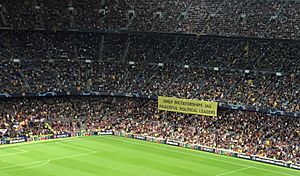
Support for Catalan independence has grown over the years. It's no longer just a goal for traditional left-wing Catalan nationalist groups. Many different kinds of people now support it.
In the Catalan Parliament, the main parties that openly support independence are Esquerra Republicana de Catalunya (ERC), Junts per Catalunya (JxCat), and the Candidatura d'Unitat Popular (CUP). Together, these parties hold a majority of the seats in the parliament.
Many famous people also support Catalan independence, including:
- Joan Massagué, a well-known scientist.
- Pep Guardiola, a famous football coach for Manchester City FC and former coach for FC Barcelona.
- Lluís Llach, a famous Catalan composer and songwriter.
- Josep Carreras, a world-famous tenor singer.
- Xavi Hernández, a famous football coach for FC Barcelona and former player.
Opposition to independence
Political Parties Against Independence
Several political parties in Catalonia are against independence. These include Ciutadans (Citizens), the People's Party of Catalonia (PP), and the Partit dels Socialistes de Catalunya (PSC). While some members of the Socialist Party once supported a self-determination vote, their official position now is that the Spanish Constitution should be changed to better include Catalonia, rather than having Catalonia leave Spain.
Another party, Catalonia In Common-We Can, supports the idea of a legal vote on independence, but they themselves are neutral on whether Catalonia should be independent. Most of their voters actually prefer Catalonia to stay part of Spain.
Anti-Independence Movement
Large demonstrations have also taken place in Barcelona against Catalan independence. For example, on October 8, 2017, a rally organized by Societat Civil Catalana drew hundreds of thousands of people who supported Spain's unity. This was one of the biggest pro-Spain demonstrations in Catalonia's history.
In 2017, a humorous idea called 'Tabarnia' became popular online. Tabarnia was a fictional region covering the urban coastal areas of Catalonia. The idea was that if Catalonia became independent, Tabarnia would want to break away from Catalonia, using similar arguments that Catalan independence supporters use against Spain. This was a way to make fun of the independence movement.
Many famous people from Catalan culture and politics have also spoken out against independence, such as:
- Joan Manuel Serrat, a well-known musician and singer-songwriter.
- Josep Borrell, a Spanish politician.
- Pau Gasol, a famous basketball player.
- Montserrat Caballé, a world-renowned opera singer.
Opinion polling
Polls are regularly conducted to understand public opinion on Catalan independence. These polls are often carried out by research groups linked to the Catalan government or universities. While the exact numbers change, these polls generally show varying levels of support for and opposition to independence.
Long-term prospects
If Catalonia were to become independent, it would face several challenges. Under Spanish law, the Spanish parliament would need to change the constitution for Catalonia to legally leave Spain. It might also be difficult for an independent Catalonia to be recognized by other countries around the world.
Most of Catalonia's exports go to the European Union. If Catalonia left Spain, it would likely also leave the EU and would need Spain's permission to rejoin. Catalonia already manages its own police, schools, healthcare, and other services. However, it would need to create new institutions like a central bank and its own tax collection system.
Economically, Catalonia is a strong region. Some estimates suggest that Catalans pay more in taxes to the Spanish government than they receive back. If independent, Catalonia would be a significant economy globally.
Criticism
People who oppose Catalan independence sometimes say that the movement is unfair or exclusive. They argue that it doesn't represent everyone in Catalonia, especially those who speak Spanish. Some critics say that the independence movement focuses too much on ethnicity and excludes Spanish-speaking Catalans.
For example, some politicians from the independence movement have been criticized for statements that seemed to divide people based on language or origin. However, supporters of independence strongly deny these claims. They say their movement is welcoming to everyone, no matter their background or language. They also point out that most far-right and anti-immigrant groups in Catalonia actually support Spanish nationalism, not independence.
Some groups supporting independence, like the Committees for the Defense of the Republic (CDR), have used peaceful resistance to protest police actions. In 2019, some members of a CDR branch were arrested on serious charges, but some were later released on bail.
See also
 In Spanish: Independentismo catalán para niños
In Spanish: Independentismo catalán para niños
- National and regional identity in Spain
- History of Catalonia
- 2017–18 Spanish constitutional crisis
- List of active separatist movements in Europe
- Nation state
 | Chris Smalls |
 | Fred Hampton |
 | Ralph Abernathy |


